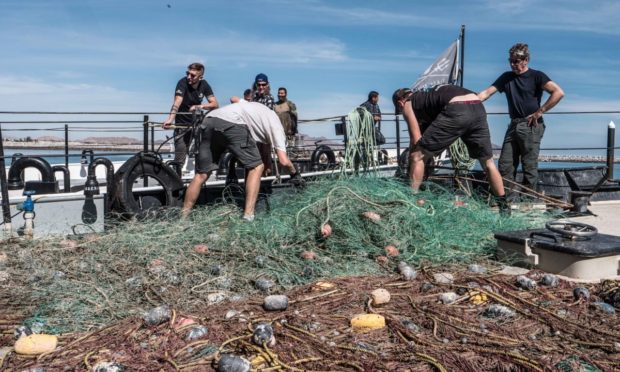
Plastic pollution from fishing nets threatening Ganges wildlife, study finds
Team Udayavani, Nov 30, 2020, 12:22 PM IST

New Delhi: Plastic pollution from discarded fishing gear in the Ganges River poses a threat to wildlife such as the critically endangered three-striped roofed turtle and the endangered Ganges river dolphin, according to an international team including researchers from the Wildlife Institute of India.
In the study, published in the journal Science of The Total Environment, surveys along the length of the river, from the mouth in Bangladesh to the Himalayas in India, show levels of waste fishing gear are highest near to the sea.
The researchers noted that fishing nets — all made of plastic — were the most common type of gear found.
Interviews with local fishers showed high rates of fishing equipment being discarded in the river — driven by short gear lifespans and lack of appropriate disposal systems, they said.
“The Ganges River supports some of the world”s largest inland fisheries, but no research has been done to assess plastic pollution from this industry, and its impacts on wildlife,” said Sarah Nelms from the University of Exeter in the UK.
“Ingesting plastic can harm wildlife, but our threat assessment focussed on entanglement, which is known to injure and kill a wide range of marine species,” Nelms said.
The researchers used a list of 21 river species of “conservation concern” identified by the Wildlife Institute of India in Uttarakhand.
They combined existing information on entanglements of similar species worldwide with the new data on levels of waste fishing gear in the Ganges to estimate which species are most at risk.
“There is no system for fishers to recycle their nets. Most fishers told us they mend and repurpose nets if they can, but if they can”t do that the nets are often discarded in the river,” said Nelms.
“Many held the view that the river ”cleans it away”, so one useful step would be to raise awareness of the real environmental impacts,” she said.
The findings offer hope for solutions based on “circular economy” where waste is dramatically reduced by reusing materials, according to Professor Heather Koldewey, from the Zoological Society of London(ZSL).
“A high proportion of the fishing gear we found was made of nylon 6, which is valuable and can be used to make products including carpets and clothing,” Koldeway said.
“Collection and recycling of nylon 6 has strong potential as a solution because it would cut plastic pollution and provide an income,” she added.
Udayavani is now on Telegram. Click here to join our channel and stay updated with the latest news.
Top News

Related Articles More

Plant-based meat alternatives linked to increased risk of depression in vegetarians, study finds

Lung transplant at right time only cure for idiopathic pulmonary fibrosis that killed Ustad Zakir Hussain

ICMR sets up India’s first diabetes biobank in Chennai

AI Meets Health: The Rise of Smart Fitness Solutions

New study links paracetamol to side effects in digestive tract, heart, kidneys among older adults
MUST WATCH
Latest Additions

Assembly clears Mysuru Development Authority Bill

Blocked 18 OTT platforms for publishing obscene, vulgar content: Govt

Boy critically injured after tree branch falls on him in Bengaluru

Congress claims party worker ‘died due to tear gas smoke’ during protest in Assam

Four dead in road accident in Kolar
Thanks for visiting Udayavani
You seem to have an Ad Blocker on.
To continue reading, please turn it off or whitelist Udayavani.




















